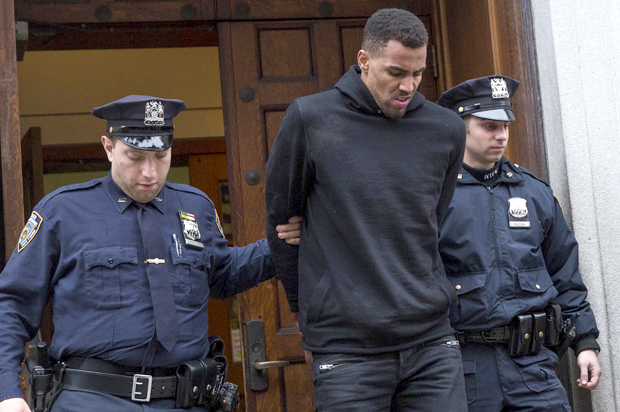In an exclusive piece for GQ, Atlanta Hawks wingman Thabo Sefolosha details, for the first time, the horrific assault he suffered at the hands of NYPD officers on April 8, 2015, that resulted in the NBA star breaking his leg and missing the playoffs.
The basics are this: On April 8, Bucks player Chris Copeland was stabbed outside New York’s 1OAK club in an unrelated incident. In the ensuing aftermath, NYPD officers, seemingly without cause, forced Sefolosha to the ground and broke his leg. The cops charged him with disorderly conduct, resisting arrest, and obstruction of governmental administration.
Sefolosha was fully exonerated of all charges on October 9.
A few days later, he revealed he planned to sue the NYPD and New York City for $50 million, relating to injuries inflicted by police that night.
Now he has opened up about the precise details of the assault for the first time.
In the GQ piece, Sefolosha explains that police officers hustled him and others out of the club after the stabbing occurred, and acknowledges that he did engage in some verbal sparring with one officer, calling him a “midget” after the officer told him “without a badge, I can fuck you up.” He also explains that he felt singled out by officers for no reason.
Sefolosha says he tried to get into a livery cab to escape the chaos outside the club, but stopped briefly to give money to a homeless man. It was at this point that police attacked him. A video acquired by TMZ appears to corroborate Sefolosha’s claims.
Here’s how he explains it:
When I made a few steps toward the guy, an officer said, “You’re going to jail.” Pero [Antic, another Hawks player] tapped the officer on the shoulder and said, “Relax, he didn’t do anything.” Another officer pushed him in the chest and he fell. That’s what the first YouTube video showed—him on the floor.
More officers started grabbing me. I was trying to put the money back in my pocket. Usually I don’t carry that much, but I had six or seven hundred dollars in my hand. One officer pulled me from my right arm, another grabbed me on my left, and another grabbed me on the back of my neck. I’m in, like, an on-a-cross type of position. I couldn’t even move. It was just chaos. I had never been arrested before. I understood a little bit late that they were trying to put me on the ground, but if somebody grabs your arms and pulls you on your neck, you fall face first.
Somebody kicked my leg, more than once, from the back to force me to the ground. I knew something had happened as soon as they did it; I’m an athlete, so I know how my body should feel. They were stepping on my foot, too, I guess to try to keep me there. I didn’t feel like there was anything I could do to calm it down. I tried to show them I was cooperating. I tried.
Ultimately, Sefolosha discovered that his leg was broken and his ligaments were torn, thus forcing him to sit out the playoffs. Sefolosha goes on to detail the legal battle that ensued, and his exoneration — largely as a result of the TMZ video and other videos his lawyers managed to find — and the emotional distress that occurred. Explaining that hhe felt “defeated and angry that all this had happened, and for no reason,” Sefolosha says he lost 15 pounds from the stress of the trial and didn’t get more than six hours of sleep for the month leading up to his trial.
Despite Sefolosha saying he doesn’t want to “make it a racial thing,” it’s hard to ignore the parallels between this incident and the many other instances of unprovoked police violence suffered by African Americans on a daily basis. “My wife and dad were outraged and in disbelief,” Sefolosha writes. “He’s from South Africa; he was in a band that was really active in denouncing the old apartheid movement. To think of this happening to his son in the streets of New York City in 2015—and I don’t really want to make it as a racial thing. I want to let people make up their own minds.”
Sefolosha concludes by saying he feels he was a victim of police brutality.
It was an act of police brutality, and I believe it could happen to anyone. Now I’m a lot more aware of everything that goes on. I’ve been, I don’t want to say disillusioned, but brought back to earth in a harsh way. I look at videos of police brutality on YouTube or CNN.com. The other day I was watching this woman getting punched by the police for recording them arresting her husband. In a situation like this, you are helpless. If there’s six people jumping me outside of the club, I scream, “Police, police!” If the police are doing this to me, who you want me to turn to?
We suggest you read the full, harrowing account over at GQ.

